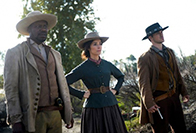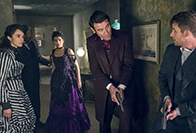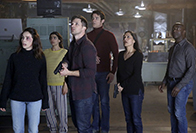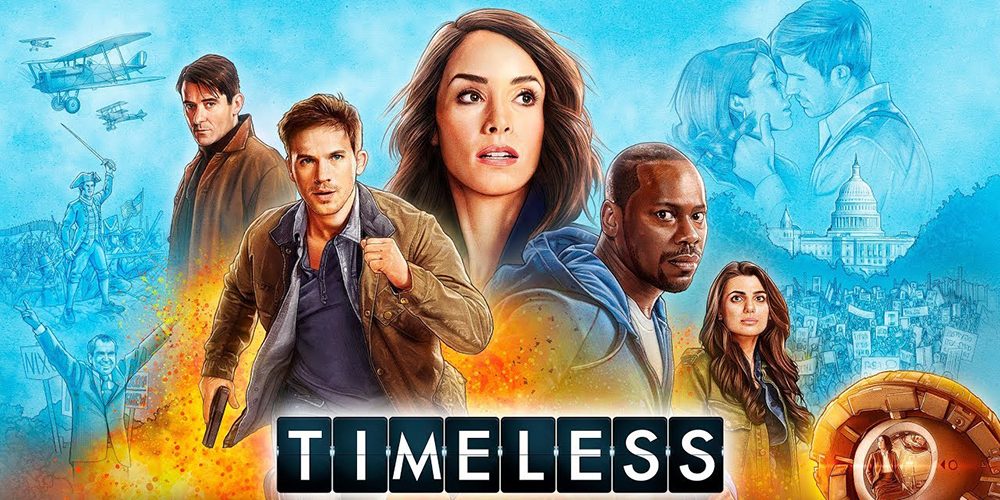Timeless is a quaint little time travel show that started on NBC’s fall lineup in 2016. It’s the story of a trio of young people (a historian, a pilot/engineer, and a soldier) recruited by a secret faction of Homeland Security to stop a terrorist from wreaking havoc in history with the use of a time machine stolen from an eccentric billionaire. Our heroes must use the backup time machine—dubbed the Lifeboat—to intercept those who wish to tear down history as we know it.
From creators Shawn Ryan (The Shield, Terriers) and Eric Kripke (Supernatural, Revolution), Timeless was already primed to have a built-in fanbase and it gathered enough of one to earn itself three bonus episodes—but not enough of one to merit a second season. After the show was canceled in May of 2017, fan outcry sent it to the top of Twitter for a spell and NBC un-canceled the show three days later for a shortened second season that aired in spring of 2018. It also prompted the most appropriate response you could think of from its grateful cast and crew, but was the sophomore season enough to earn a third chance?
WHAT DID NOT WORK
Keeping the main trio apart for most of the season.

Wyatt’s an idiot, and other troubling effects of the Love Triangle of Doom.
I don’t think there’s a single person who didn’t see the Jessica twist coming—except dimwit Wyatt, of course. From the moment Jessica showed up, mysteriously alive again and ready to screw with Wyatt and Lucy’s burgeoning romance, viewers knew she was up to no good. A few key clues—some kept from Wyatt, some kept by Wyatt—were more than enough to get every other character on the same page, but Wyatt, out of a desperate need to believe his wife was really the wife he remembers, managed to make enough bad choices that the entire operation and the lives of his friends are threatened.
Not only was the impeccably poor timing of Jessica’s inevitable return a tired cliché, but Wyatt’s insistence of his wife’s innocence made him look like a phenomenal idiot. Sure, Wyatt’s function on the team has always been that of brawn over brains, but we’ve never been led to believe he’s that stupid. Maybe if we’d formed an attachment to Jessica prior to her appearance or Lucy and Wyatt had never gotten together then her presence wouldn’t have been as annoying, but all these mistakes added together turned Wyatt into a despised character among fans.
Personally, I feel Wyatt’s choices were entirely understandable—Lucy is even the first to forgive him—but I’m finding I’m in the minority, as many fans have turned on Wyatt at the drop of a hat and pledged their allegiance to Flynn (Goran Visnjic) instead. In any case, the damage has been done and Wyatt has a lot to make up for if we get a season three.
Rufus is kind of a grumpy jerk.
Rufus was a beloved geek in season one, providing some levity and perspective to the team’s adventures while still being an integral part of the team. In season two, his crush on coworker Jiya (Claudia Doumit) is finally requited but nothing else about Rufus’s character progresses. When Jiya confesses that she’s been having premonitions, he is understandably upset she kept it from him, but only after he’s rudely dismissive of her claims (sure, time travel is totally okay, but premonitions are a bridge too far). For the rest of the season, he vacillates between chauvinistically overprotective and way too cavalier about the severity of the situation. I still cared about our pilot at the end of the season, but a grumpy Rufus is not the Rufus I came to adore in season one.
WHAT SORT OF WORKED
Flynn is now our homeboy, I guess.

Personally, I found the speed with which Flynn was forgiven off-putting, considering how many people he killed and how much history he destroyed on his vendetta. Everything he’s done was way worse than Wyatt’s mistake, but since he’s hanging around like a creepy sidekick, making snarky remarks from the sidelines, everything is forgiven, according to the fanbase. I’ll admit, I enjoy a good villain-turned-reluctant-anti-hero storyline, but I’m not completely sold on Flynn yet.
The complete and utter disregard for history.
This may be a deal-breaker for some fans but I have to admit that my second favorite thing is this show’s complete and utter disregard for history. I love its mad dash through time without a care to continuity, but I am also the first to admit that it’s an obvious flaw in the show’s design.
Lucy, Rufus, and Wyatt manage to preserve much of history but there is a lot that is forever altered. The time travelers are immune to the effects of a changing timeline, so Lucy, the stalwart historian, faithfully reminds us of what was lost at the end of every episode. Seeing as real, impactful historical moments are being threatened, one would expect the ripples to be a lot bigger, but this show likes to pretend that the changes don’t matter much. It’s a little frustrating to have something like that glossed over, but that’s just the charm of Timeless.
Over confidence in the seeding of future storylines.
Season two did a lot to advance the Rittenhouse storyline and gave us a lot of hints as to how things eventually come together. Several storylines—Lucy delivering a journal to Flynn in the future, the psychological damage that could result from time travel, Lucy’s shadowy legacy, the nature of Jiya’s premonitions—were touched on but none were resolved. For a show with powerhouse ratings, it would be comforting to know the writers have a game plan several years ahead. For a show that barely scored a second season, however, one would think the writers would be a little less eager to introduce storylines that may never be resolved.
WHAT TOTALLY WORKED
The shameless hero-worshipping of historical Americans.
If you set aside the frustration at this show’s rewrites of history and just indulge yourself, it’s hard not to enjoy the ride. Season two explores a wide variety of historical figures, from Harriet Tubman, to Robert Johnson, to John F. Kennedy, Marie Curie, William Randolph Hearst, Wendell Scott, Hedy Lamarr—the list goes on. You can tell the writers just adore these historical figures they get to play around with. The depictions may be a bit hyperbolic, but I still learned a lot I didn’t know before by looking the subject up after every episode. I never knew actress Hedy Lamarr was also a renowned inventor whose work was a precursor to modern-day Bluetooth technology. I’d never heard of Wendell Scott, the first African American NASCAR driver to win a race in the Grand Nationals, or Mary Grace Humiston, the first female U.S. Attorney, nicknamed “Mrs. Sherlock Holmes.”Everyone gets in on the action.
With only ten episodes, you’d think that the supporting cast would be left in the dust but season two made sure that everyone got their moment to shine. Jiya’s visions, which started as a result of her time travel at the end of season one, carried into season two and Jiya herself went through a couple significant experiences that left her a different person by the finale. We also found out that the time machine’s creator, Connor Mason, had lied about using it in the past; thus, we got to experience Mason’s first wondrous time travel experience, in which he got to meet his blues hero, Robert Johnson, and leave his own small mark on history. The program’s director, Agent Christopher [Sakina Jaffrey], never got to travel back in time but we did get to see our heroes interact with her young self in 1981, where they had to work against Rittenhouse to save the boss they know and love in the present.
DAT. CLIFFHANGER.

After a modest sophomore season, I was fully ready to accept that we may not get more of this show, and I actually might have been okay with it if it had not been for their last minute twist. When Jiya’s premonitions about Rufus dying were tragically realized, our heroes felt utterly defeated… until a new time machine randomly appeared and from it emerged the future versions of Wyatt and Lucy, enthusiastically declaring that it was time to save Rufus and blowing all of our minds in the process. The show had reminded us several times throughout the season that time travelers were limited to periods in which they did not yet exist, which means the last 3 decades are off-limits to our trio of heroes. This has been an established rule from the start, presumably to prevent the deus ex machina of fixing what they literally just broke (and saving us all from the subsequent confusion). Perhaps it wasn’t the most surprising twist, since they did change another rule this season—allowing four time travelers in the Lifeboat instead of three—and they reminded us that the ability to travel to a time in which you lived wasn’t possible… “yet.” That said, this rule changes everything, and if we get a miraculous season three, I look forward to seeing how this show plays the game from here on in. If this really is the end, then I’ll be disappointed that another beloved show ended on a cliffhanger, but I will remember to be grateful for the 26 episodes we did get for this little show that could.








